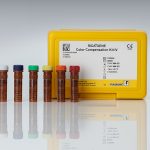Intended use:
For in vitro diagnostic use. RIDA®GENE Viral Stool Panel I is a multiplex real-time RT-PCR for the direct, qualitative detection and differentiation of norovirus, rotavirus, adenovirus 40/41 and astrovirus in human stool samples. The RIDA®GENE Viral Stool Panel I multiplex real-time RT-PCR is intended for use as an aid in diagnosis of gastroenteritis caused by norovirus, rotavirus, adenovirus 40/41 and astrovirus, respectively.
General information:
Acute Gastroenteritis is one of the main causes of morbidity and mortality worldwide. Especially in children, enteral viruses are the primary cause of gastroenteritis. In the US, viral infections cause approximately 30.8 million cases of gastroenteritis, yearly. The most important pathogens causing diarrhea are norovirus, rotavirus, adenovirus and astrovirus. Noroviruses belong to the family of Caliciviridae and are single-stranded RNA (ssRNA) viruses. Gastroenteritis caused by norovirus is manifested by severe nausea, vomiting and diarrhoea. Noroviruses are egested by stool and with the vomit. They can be grouped in 7 genogroups with currently over 30 genotypes and a multiplicity of clades. So far, human pathogens have only been described from genogroup I (GI) with 9 genotypes, from genogroup II (GII) with 22 genotypes and from genogroup IV (GIV) with two genotypes. In the US, it is estimated, that more than 21 million cases of acute gastroenteritis, 70,000 hospitalisations and 800 deaths are caused by norovirus infections each year. Rotaviruses belong to the Reoviridae familiy of non-enveloped icosahedral double-stranded RNA (dsRNA) viruses. Symptoms of rotavirus infection are usually vomiting, watery diarrhoea and abdominal pain. The virus is transmitted by the fecal-oral route through contaminated hands and objects. Rotavirus is the main cause of diarrhoea in children aged under five and is responsible for the death of an estimated 611,000 children worldwide each year. Rotaviruses are classified in seven serogroups A – G, whereby the viruses of serogroup A are of major epidemiologic importance. Adenoviruses belong to the Adenoviridae family of non-enveloped icosahedral double-stranded (dsDNA) viruses. One differentiates 56 serotypes of human adenoviruses and they are classified into seven groups (A – G). Adenoviruses mainly cause respiratory diseases, whereas Gastroenteritis is primarily caused by serotype 40 and 41. Astroviruses are single-stranded (ssRNA) viruses and belong to the family of Astroviridae. An astroviral-dependent Gastroenteritis is primarily manifested by dirarrhoea, but can also be accompanied by vomiting and fever. In developed countries, the Astrovirus incidence is between 2 – 9%, where the disease mainly affects children under the age of two. Today, there are 8 serotypes described, with serotypes 1-5 being most relevant. The infection is transmitted by contaminated foods, by water and by the fecal-oral route.
| Art. No. | PG1315 |
|---|---|
| Test format | real-time RT-PCR with 100 reactions |
Dear customers,
we have started to provide the documents for our products in an electronic format. These are the Instructions for Use (IFU), the Safety Data Sheets (SDS) and the Certificate of Analysis (CoA). For batches placed on the market after 01 January 2023, you can find our documents on the eIFU portal eifu.r-biopharm.com.










